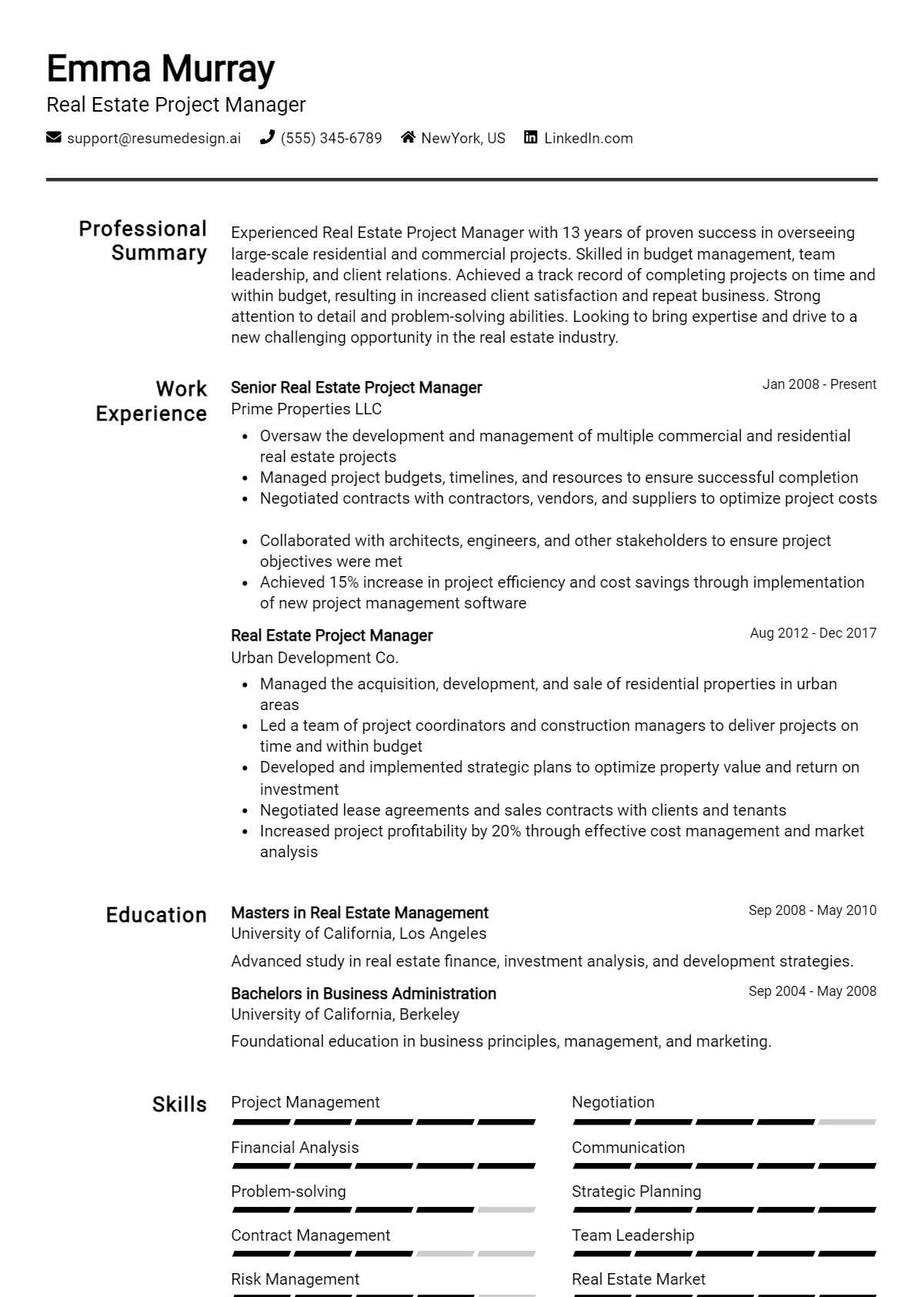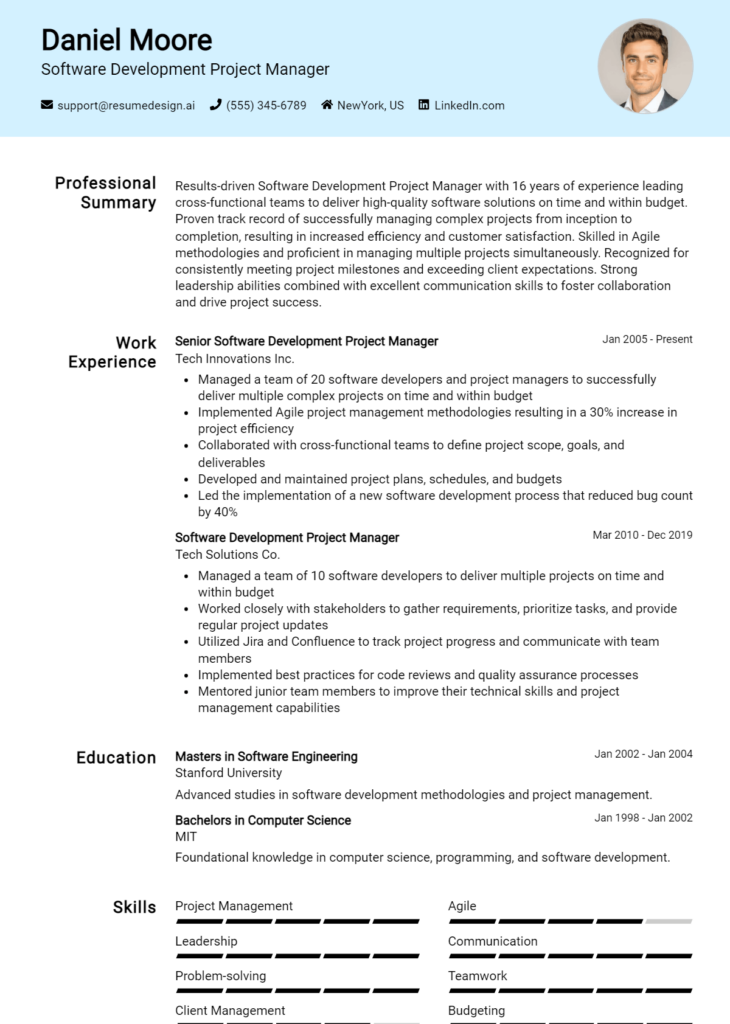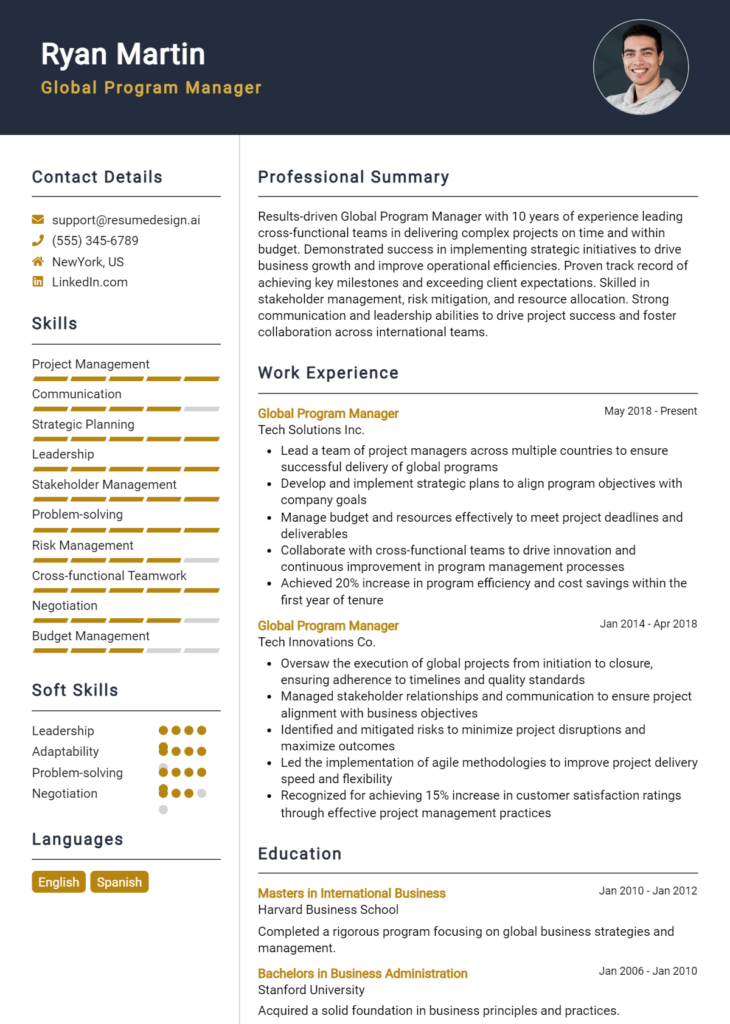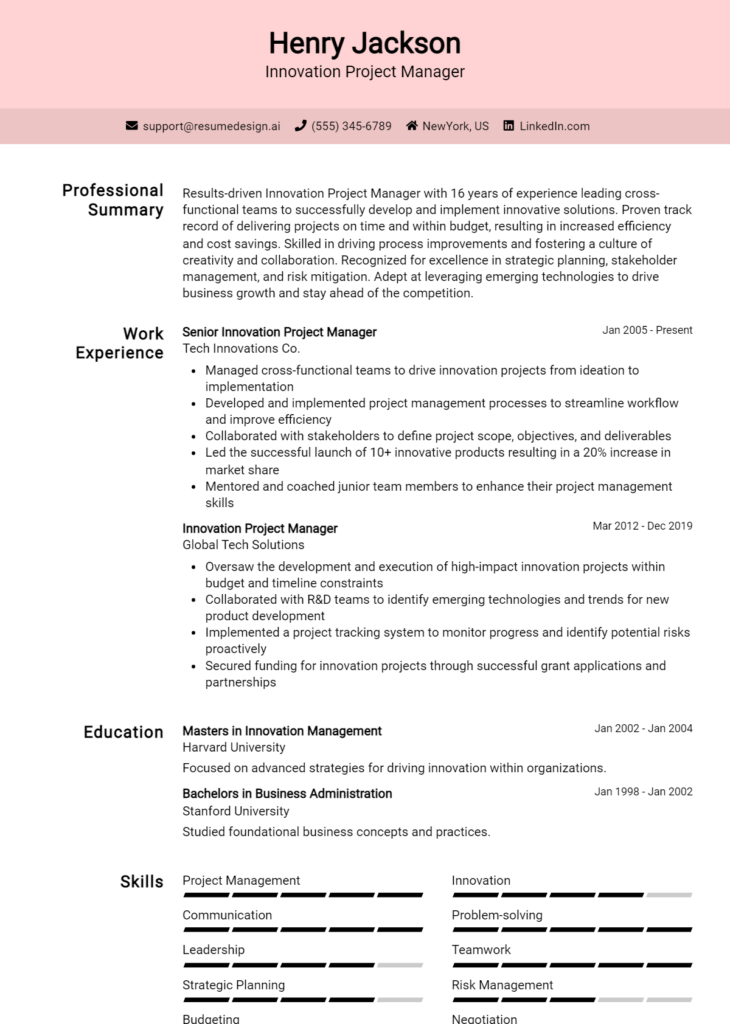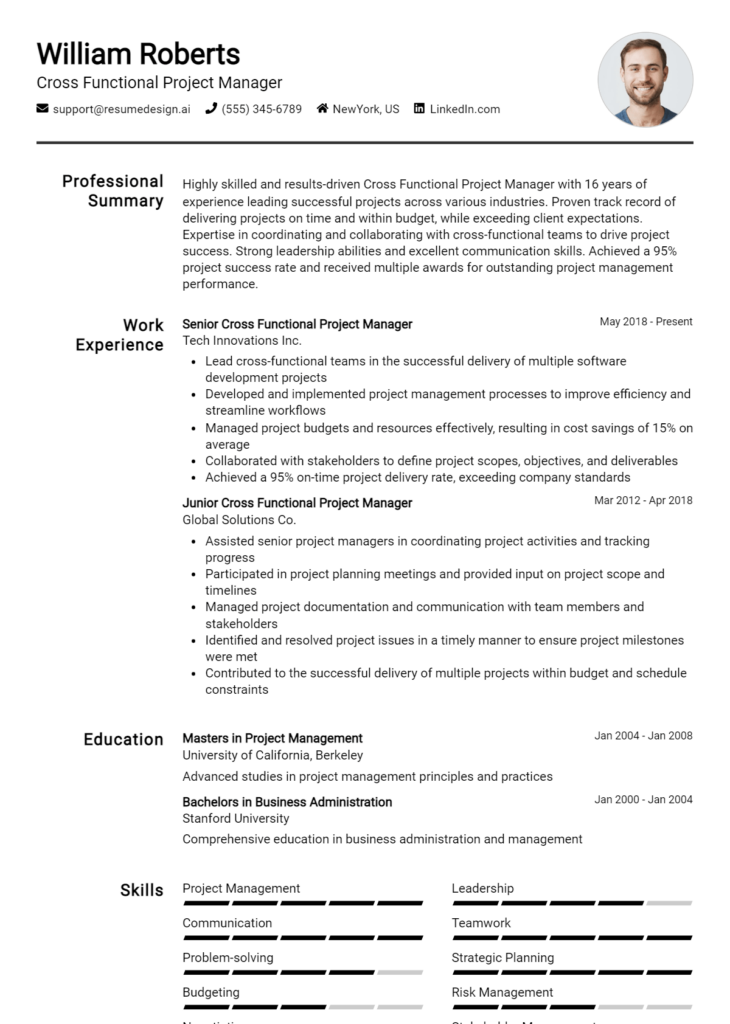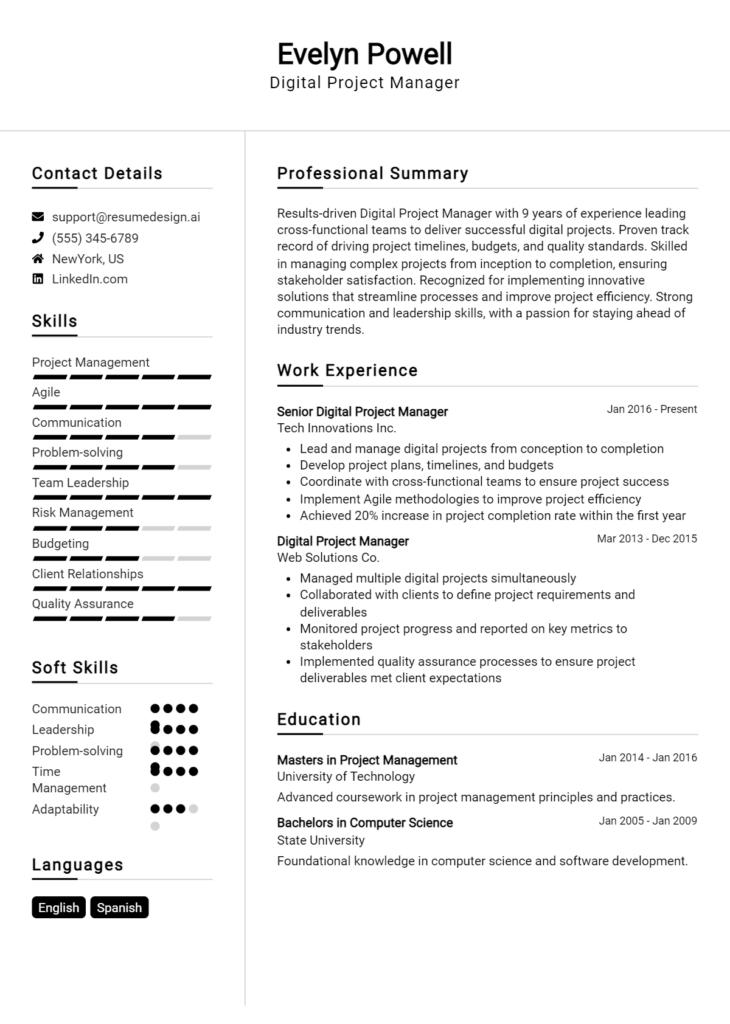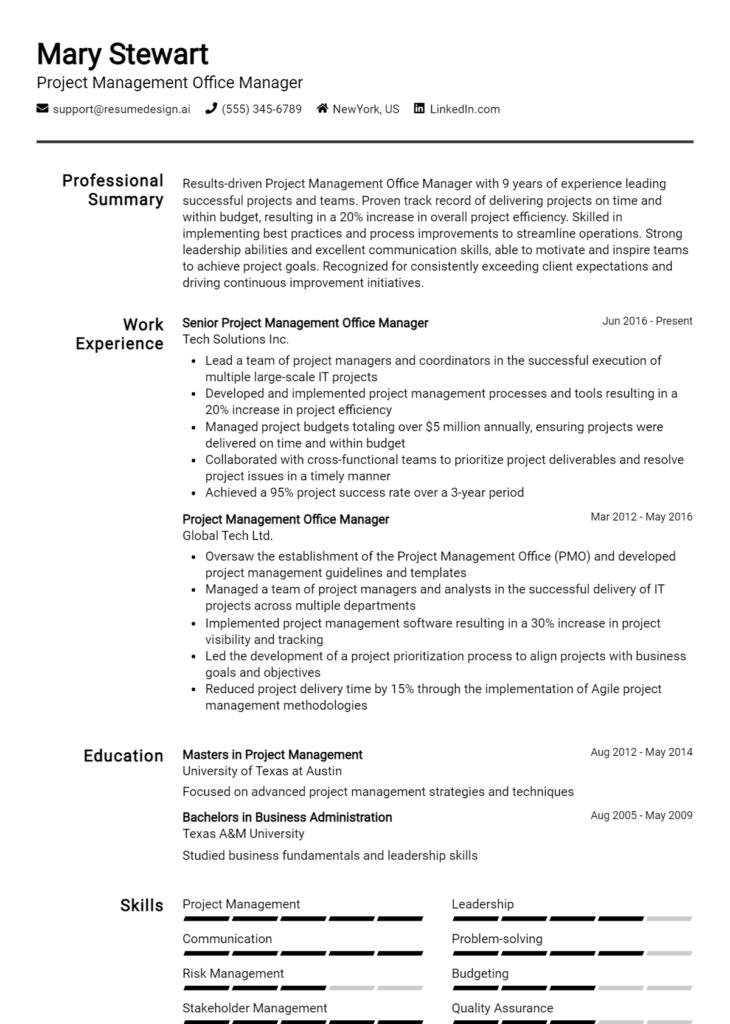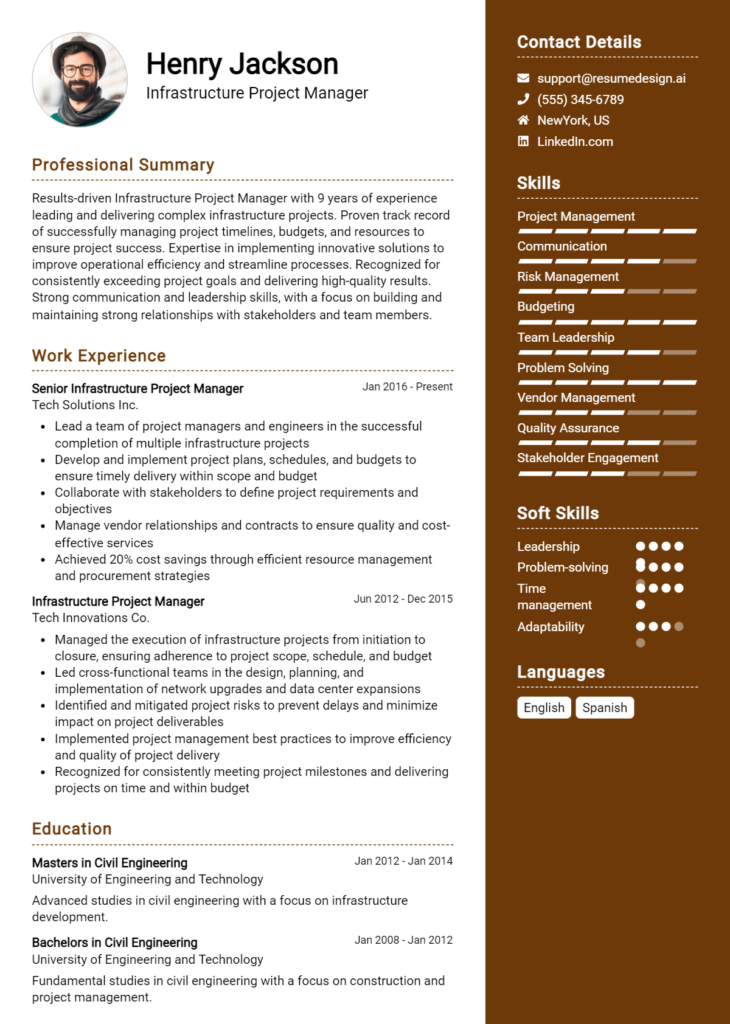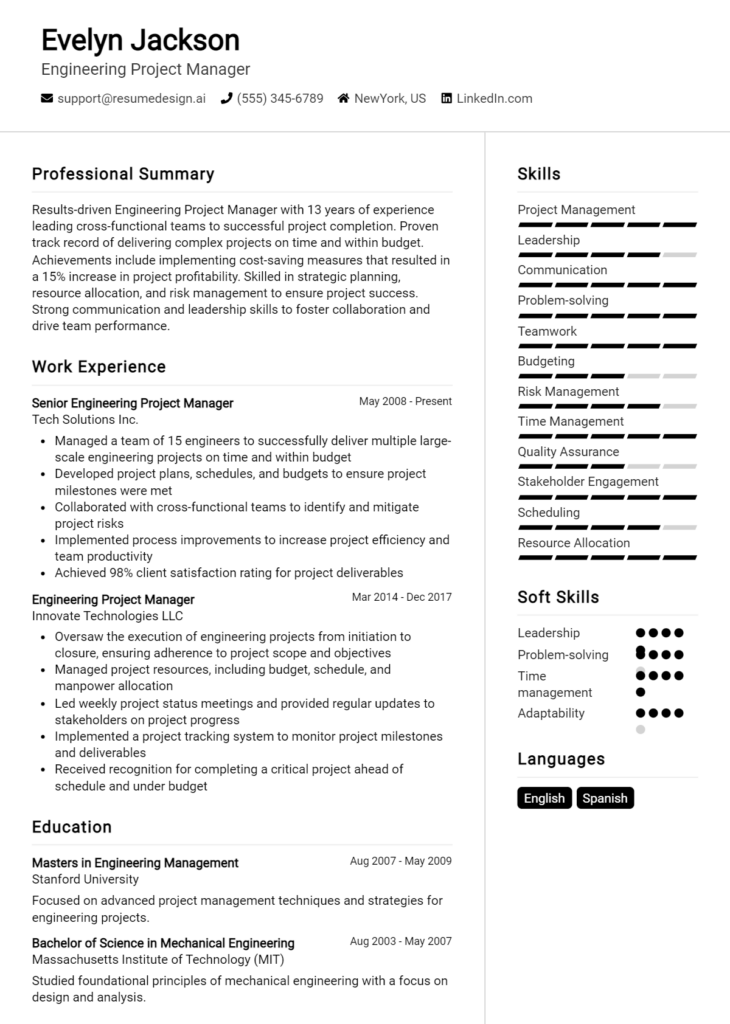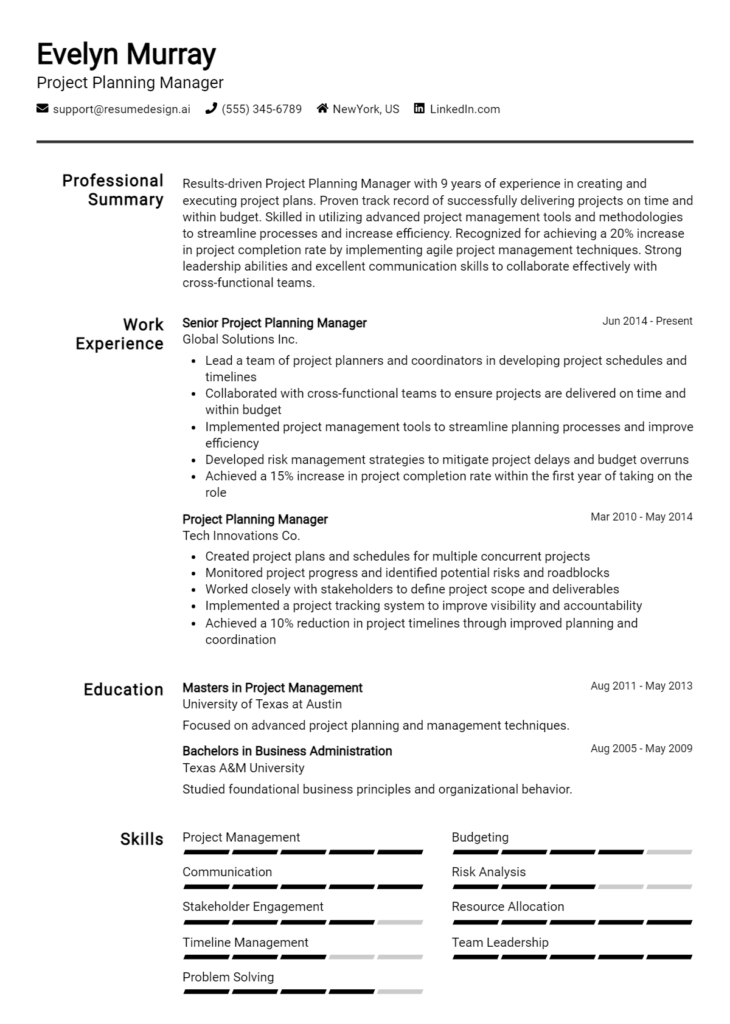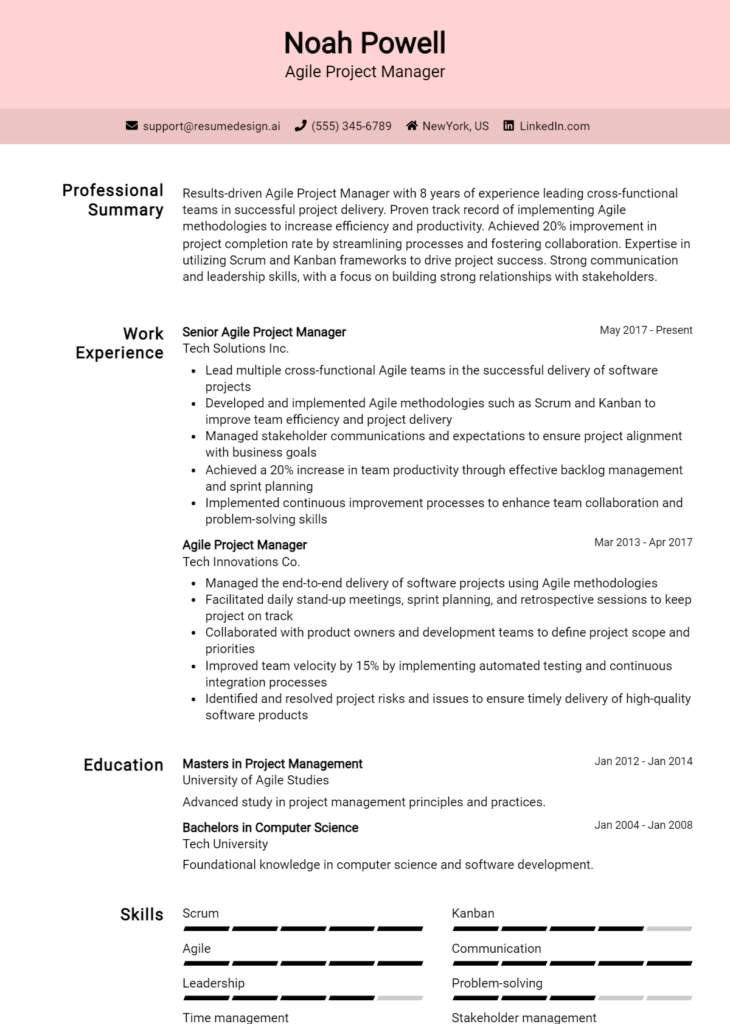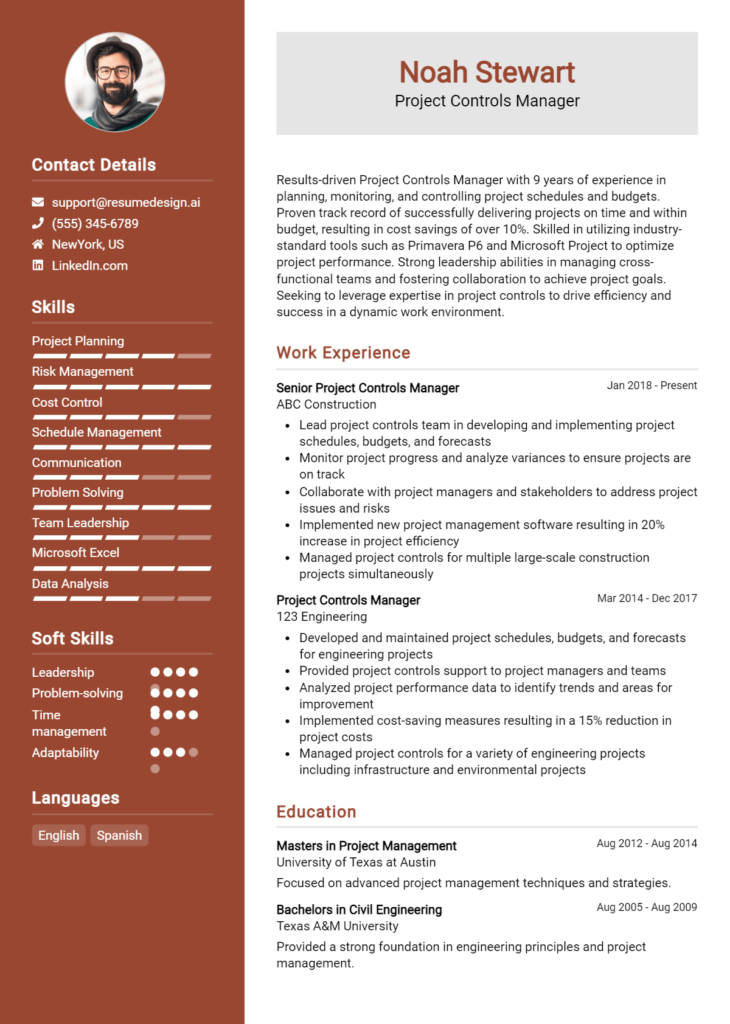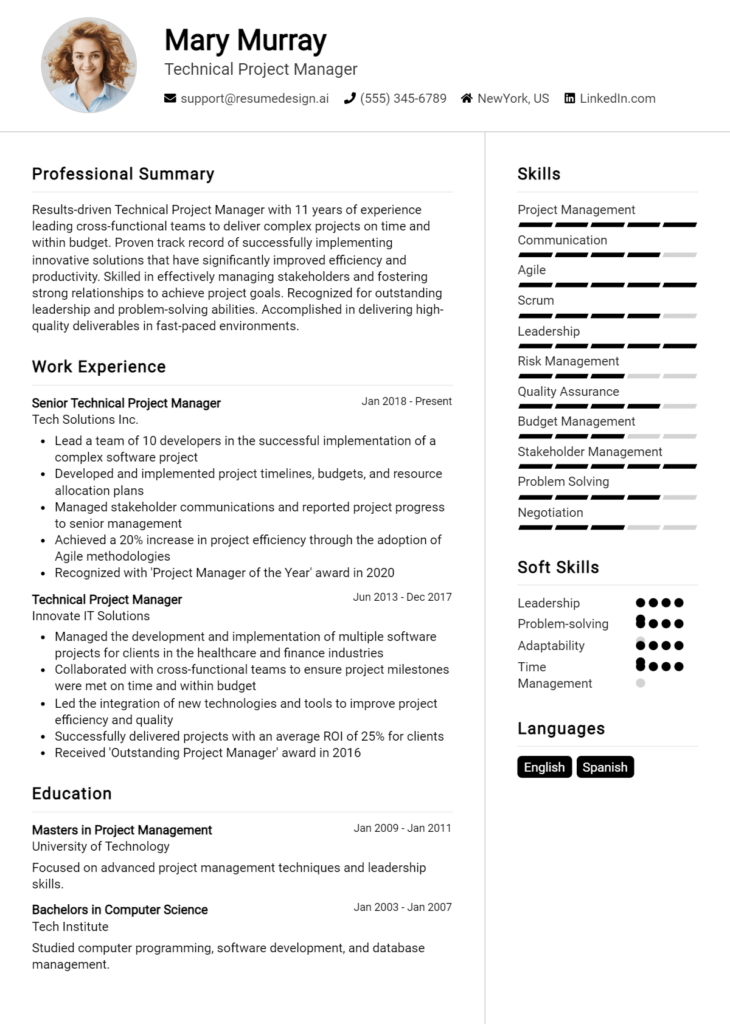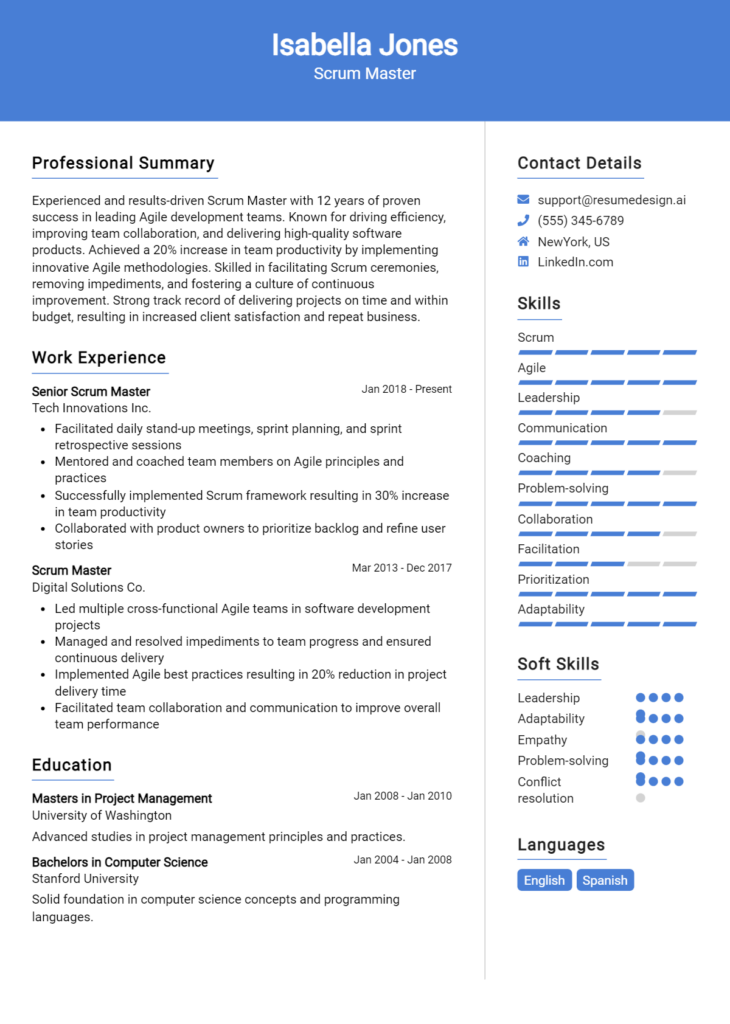Real Estate Project Manager Core Responsibilities
A Real Estate Project Manager plays a crucial role in overseeing property development and ensuring that projects run smoothly across various departments. Key responsibilities include coordinating with architects, contractors, and stakeholders, managing budgets, and adhering to timelines. Essential skills encompass technical knowledge of real estate regulations, operational efficiency, and advanced problem-solving abilities. These competencies not only drive project success but also align with the organization’s broader goals. A well-structured resume effectively highlights these qualifications, demonstrating the candidate’s potential impact.
Common Responsibilities Listed on Real Estate Project Manager Resume
- Developing project plans and timelines
- Coordinating with cross-functional teams and stakeholders
- Managing budgets and financial forecasts
- Ensuring compliance with local regulations and zoning laws
- Overseeing construction activities and timelines
- Conducting risk assessments and implementing mitigation strategies
- Facilitating communication between clients and contractors
- Monitoring project progress and reporting updates
- Negotiating contracts and agreements
- Conducting market research and feasibility studies
- Leading project meetings and ensuring team alignment
- Evaluating and selecting vendors and subcontractors
High-Level Resume Tips for Real Estate Project Manager Professionals
In the competitive field of real estate project management, a well-crafted resume is vital for making a strong first impression on potential employers. Your resume serves as a marketing tool that encapsulates your professional journey, showcasing not only your skills but also your achievements in the industry. A compelling resume can differentiate you from other candidates, highlighting your unique qualifications and experiences that align with the job role. This guide offers practical and actionable resume tips specifically tailored for Real Estate Project Manager professionals, ensuring you present yourself in the best possible light to prospective employers.
Top Resume Tips for Real Estate Project Manager Professionals
- Tailor your resume to each job description by incorporating relevant keywords and phrases from the posting.
- Highlight your relevant experience in real estate projects, including specifics about the types of properties and projects you’ve managed.
- Quantify your achievements with metrics, such as percentage improvements in project completion times or budget savings.
- Showcase your industry-specific skills, such as knowledge of zoning regulations, property valuation, and market analysis.
- Include certifications and licenses relevant to real estate project management, such as PMP or LEED certification.
- Utilize a clear and professional format that enhances readability, making it easy for hiring managers to scan your resume.
- Emphasize leadership and collaboration skills, illustrating your ability to manage teams and coordinate with various stakeholders.
- Incorporate a strong summary statement at the top of your resume that encapsulates your core competencies and career goals.
- Use action verbs to describe your responsibilities and accomplishments, creating a dynamic and engaging narrative.
- Keep your resume concise, ideally one page, focusing on the most relevant information that aligns with the job requirements.
By implementing these tips, you can significantly enhance your resume, increasing your chances of landing a job in the competitive field of Real Estate Project Management. A polished and targeted resume not only showcases your qualifications but also communicates your professionalism and dedication to potential employers, setting you on the path to success in your career.
Why Resume Headlines & Titles are Important for Real Estate Project Manager
In the competitive field of real estate, a Project Manager plays a critical role in overseeing property development and ensuring that projects are completed on time and within budget. Given this importance, a well-crafted resume headline or title can make a significant difference in capturing the attention of hiring managers. A strong headline not only summarizes a candidate's key qualifications in one impactful phrase but also acts as a hook that encourages hiring managers to read further. It should be concise, relevant, and directly aligned with the job being applied for, effectively setting the tone for the rest of the resume.
Best Practices for Crafting Resume Headlines for Real Estate Project Manager
- Be concise: Aim for a headline that is one short sentence or phrase.
- Be specific: Use keywords relevant to the real estate industry and project management.
- Highlight key qualifications: Include your most impressive skills or experiences.
- Use action-oriented language: Verbs can convey confidence and proactivity.
- Tailor to the job: Customize your headline for each specific position you apply for.
- Limit jargon: Ensure clarity over complexity to appeal to a broader audience.
- Focus on results: Mention outcomes you’ve achieved in past roles to showcase your effectiveness.
- Keep it professional: Maintain a formal tone appropriate for the real estate sector.
Example Resume Headlines for Real Estate Project Manager
Strong Resume Headlines
Dynamic Real Estate Project Manager with 10+ Years of Experience in High-Value Developments
Results-Driven Project Manager Specializing in Residential and Commercial Real Estate Investments
Certified Project Management Professional (PMP) with Proven Success in Delivering Multi-Million Dollar Projects
Strategic Real Estate Leader with Expertise in Cost Management and Sustainability Initiatives
Weak Resume Headlines
Real Estate Manager
Project Manager Seeking Opportunities
Experienced Professional in Real Estate
Strong headlines are effective because they immediately convey a candidate's unique value proposition, incorporating specific experiences and accomplishments that are relevant to the role of a Real Estate Project Manager. In contrast, weak headlines fail to impress because they lack specificity and do not effectively communicate the candidate’s qualifications or the impact they can bring to a potential employer. By presenting a clear and compelling narrative through strong headlines, candidates can significantly enhance their chances of standing out in a crowded job market.
Writing an Exceptional Real Estate Project Manager Resume Summary
A well-crafted resume summary is crucial for a Real Estate Project Manager, as it serves as the first impression for hiring managers. This brief yet powerful section quickly captures attention by highlighting key skills, relevant experience, and notable accomplishments that align with the specific job role. A strong summary not only showcases the candidate's qualifications but also conveys their potential value to the organization, all while being concise and impactful. Tailoring the summary to the job application is essential, ensuring that the hiring manager sees the most pertinent information at a glance.
Best Practices for Writing a Real Estate Project Manager Resume Summary
- Quantify Achievements: Use numbers and metrics to demonstrate the impact of your work, such as project budgets, timelines, or team sizes.
- Focus on Skills: Highlight key skills that are relevant to the role, such as project management, negotiation, and risk assessment.
- Tailor to the Job Description: Customize the summary for each application to align with the specific needs and requirements outlined in the job posting.
- Keep it Concise: Aim for 3-5 sentences that succinctly summarize your background and strengths.
- Showcase Relevant Experience: Prioritize experiences that directly relate to real estate project management, emphasizing leadership roles and successful project completions.
- Highlight Industry Knowledge: Mention familiarity with market trends, regulatory requirements, and real estate technologies that are valuable in the role.
- Use Strong Action Verbs: Start sentences with powerful verbs to convey confidence and capability.
- Avoid Jargon: Keep language clear and accessible, avoiding overly technical terms that might confuse hiring managers.
Example Real Estate Project Manager Resume Summaries
Strong Resume Summaries
Dynamic Real Estate Project Manager with over 7 years of experience leading multifamily residential projects, successfully delivering 95% of projects on time and under budget, resulting in a 15% increase in client satisfaction scores.
Results-driven Project Manager with a proven track record of managing over $10 million in real estate developments, leveraging strong negotiation skills to secure contracts that reduced costs by 20% while maintaining quality standards.
Accomplished Real Estate Project Manager skilled in overseeing commercial property renovations, with expertise in coordinating cross-functional teams to achieve project milestones that improved operational efficiency by 30%.
Weak Resume Summaries
Experienced project manager with knowledge of real estate and construction. Looking for a new opportunity in a leading company.
Detail-oriented individual seeking to apply project management skills in real estate. Familiar with various aspects of the industry.
The examples provided illustrate the key differences between strong and weak resume summaries. Strong summaries are impactful and specific, showcasing quantifiable achievements and relevant skills that directly relate to the Real Estate Project Manager role. In contrast, the weak summaries lack detail and measurable outcomes, making them too vague and generic to capture a hiring manager's interest effectively.
Work Experience Section for Real Estate Project Manager Resume
The work experience section of a Real Estate Project Manager resume is arguably one of the most critical components, as it provides potential employers with a comprehensive overview of the candidate's technical skills and project management capabilities. This section not only showcases the ability to manage teams effectively but also highlights a track record of delivering high-quality projects. By quantifying achievements—such as project timelines, budgets, and team sizes—and aligning past experiences with industry standards, candidates can demonstrate their suitability for the role and their potential to contribute to future projects.
Best Practices for Real Estate Project Manager Work Experience
- Highlight technical skills relevant to real estate project management, such as software proficiency (e.g., AutoCAD, MS Project).
- Quantify achievements with specific metrics, such as percentage of budget saved, time saved on project delivery, or the number of successful projects completed.
- Showcase leadership and collaboration by detailing experiences leading diverse teams and working with stakeholders.
- Align your experiences with industry standards and terminologies to demonstrate familiarity with best practices.
- Utilize action verbs to convey your contributions and impact effectively.
- Include relevant certifications or training that enhance your qualifications in real estate project management.
- Tailor your work experience to match the job description and requirements of the position you are applying for.
- Emphasize problem-solving skills by presenting challenges faced and how solutions were implemented successfully.
Example Work Experiences for Real Estate Project Manager
Strong Experiences
- Successfully led a $5 million commercial redevelopment project, completing it 10% under budget and two months ahead of schedule, resulting in a 15% increase in ROI for the stakeholders.
- Managed a cross-functional team of 20 members in the construction of a 150-unit residential complex, improving team efficiency by implementing agile project management techniques.
- Coordinated with local government and community stakeholders to secure permits and approvals for a mixed-use development, reducing approval time by 30% through effective stakeholder engagement.
- Developed and executed a risk management plan for a large-scale urban revitalization project, mitigating potential delays and saving the project an estimated $200,000 in unforeseen costs.
Weak Experiences
- Worked on various real estate projects without specifying roles or outcomes.
- Assisted team members with tasks and responsibilities but did not highlight any significant contributions.
- Involved in project planning and management without mentioning specific tools or methodologies used.
- Participated in meetings and discussions but failed to outline any measurable impact or results from those efforts.
The examples provided highlight the contrast between strong and weak experiences in a Real Estate Project Manager's resume. Strong experiences are characterized by clear quantifiable outcomes, specific roles, and impactful contributions that align with industry standards. In contrast, weak experiences lack detail and measurable results, making it difficult for potential employers to assess the candidate's true capabilities and achievements. Strong examples not only demonstrate technical expertise but also showcase leadership and collaboration, essential traits for a successful Real Estate Project Manager.
Education and Certifications Section for Real Estate Project Manager Resume
The education and certifications section of a Real Estate Project Manager resume is crucial as it underscores the candidate's academic qualifications, industry-specific training, and commitment to ongoing professional development. This section not only showcases the relevant degrees attained but also highlights industry-recognized certifications and specialized coursework that can significantly enhance a candidate's credibility. By detailing their educational background and continuous learning efforts, candidates can effectively align themselves with the expectations of potential employers, demonstrating their preparedness to handle the complexities of real estate projects.
Best Practices for Real Estate Project Manager Education and Certifications
- Include only relevant degrees and certifications that align with the real estate industry.
- Provide details about specialized coursework that pertains to project management, real estate finance, or urban planning.
- List certifications from recognized industry bodies, such as the Project Management Professional (PMP) or Certified Commercial Investment Member (CCIM).
- Highlight any continuing education courses or workshops attended that demonstrate a commitment to staying current in the field.
- Use clear formatting to make the section easy to read, ensuring that critical information stands out.
- Prioritize advanced degrees or certifications that may give you an edge over other candidates.
- Consider adding a brief description of each certification to clarify its relevance and importance.
- Keep the section concise, focusing on the most impactful qualifications to avoid overwhelming the reader.
Example Education and Certifications for Real Estate Project Manager
Strong Examples
- MBA in Real Estate and Urban Development, University of XYZ
- Project Management Professional (PMP) Certification, Project Management Institute
- Certified Commercial Investment Member (CCIM) Designation
- Coursework in Real Estate Finance, Property Development, and Risk Management
Weak Examples
- Bachelor's Degree in English Literature, University of ABC
- Certification in Basic Computer Skills
- Real Estate License obtained over 10 years ago with no additional certifications
- Coursework in General Education Requirements, unrelated to real estate or project management
The strong examples listed above are considered effective because they directly relate to the responsibilities and skills required for a Real Estate Project Manager role. They showcase advanced education, relevant certifications, and specialized coursework that enhance the candidate's profile. In contrast, the weak examples reflect qualifications that lack relevance to the real estate industry or project management, making them less impactful in demonstrating the candidate's suitability for the role. By focusing on strong, relevant qualifications, candidates can present themselves as well-prepared and knowledgeable professionals in the field.
Top Skills & Keywords for Real Estate Project Manager Resume
In the competitive field of real estate project management, having the right skills is crucial for success. A well-crafted resume that highlights both hard and soft skills can set a candidate apart from the competition. Employers are not only looking for technical proficiency but also for the interpersonal abilities that enable effective collaboration and problem-solving. A balanced mix of these skills demonstrates a candidate's capability to manage complex projects, navigate challenges, and lead teams effectively. As you prepare your resume, focusing on these essential skills will help showcase your qualifications and align your experience with the demands of the role.
Top Hard & Soft Skills for Real Estate Project Manager
Soft Skills
- Communication
- Leadership
- Negotiation
- Problem-solving
- Team Collaboration
- Time Management
- Critical Thinking
- Adaptability
- Conflict Resolution
- Client Relations
- Decision Making
- Emotional Intelligence
- Networking
- Active Listening
- Resilience
Hard Skills
- Project Management Software (e.g., MS Project, Trello)
- Budgeting and Financial Analysis
- Risk Management
- Real Estate Market Analysis
- Contract Management
- Construction Management
- Legal Compliance and Regulations
- Geographic Information Systems (GIS)
- Quality Assurance
- Vendor Management
- Data Analysis
- Property Valuation
- Site Selection
- Scheduling and Planning
- Environmental Assessment
- Building Codes and Safety Standards
For more insights on essential skills and how to showcase your work experience effectively, check out additional resources.
Stand Out with a Winning Real Estate Project Manager Cover Letter
I am excited to apply for the Real Estate Project Manager position at [Company Name], as advertised on [Job Board/Company Website]. With over [X years] of experience in managing diverse real estate projects from inception to completion, I have honed my ability to deliver projects on time and within budget while maintaining a strong focus on quality and client satisfaction. My comprehensive understanding of the real estate market, coupled with my project management skills, positions me as an ideal candidate to contribute to your team's success and enhance [Company Name]'s reputation for excellence in real estate development.
In my previous role at [Previous Company Name], I successfully led a team in the planning and execution of a [describe a specific project, e.g., multi-family residential complex, commercial office building, etc.], which resulted in a [quantifiable outcome, e.g., 20% increase in ROI, completion ahead of schedule]. My responsibilities included coordinating with architects, contractors, and stakeholders to ensure all aspects of the project aligned with our strategic goals. I pride myself on my ability to build strong relationships and foster collaboration among cross-functional teams, which has proven invaluable in navigating the complexities of real estate development.
Moreover, I am adept at utilizing project management software and tools to streamline processes, track progress, and report on project milestones. My experience with budget management and risk assessment allows me to identify potential challenges early on and implement effective solutions, ensuring project success. I am particularly drawn to [Company Name] because of your commitment to innovative and sustainable real estate practices, and I am eager to leverage my skills to help elevate your projects and exceed client expectations.
I am looking forward to the opportunity to discuss how my background, skills, and enthusiasms align with the goals of [Company Name]. Thank you for considering my application. I am excited about the possibility of contributing to your team and would welcome the chance to further discuss my qualifications in an interview.
Common Mistakes to Avoid in a Real Estate Project Manager Resume
When crafting a resume for a Real Estate Project Manager position, it's essential to present your skills and experiences effectively. However, many candidates make common mistakes that can diminish their chances of securing an interview. Understanding these pitfalls can help you create a more impactful resume that highlights your qualifications and sets you apart from the competition. Here are some common mistakes to avoid:
Generic Objective Statements: Using a one-size-fits-all objective that lacks specificity can make you seem uninterested. Tailor your objective to reflect your career goals and how they align with the company’s mission.
Neglecting Relevant Skills: Failing to showcase specific skills relevant to real estate project management, such as budgeting, negotiation, and stakeholder communication, can weaken your candidacy. Ensure these skills are prominent and backed by examples.
Overloading with Jargon: While industry terminology is important, overloading your resume with jargon can make it difficult for hiring managers to understand your qualifications. Use clear language that balances professionalism with readability.
Lack of Quantifiable Achievements: Simply listing job responsibilities without quantifying your achievements can lead to a lackluster resume. Use metrics to demonstrate your impact, such as "managed a $5 million project" or "increased efficiency by 20%."
Ignoring Formatting Consistency: Inconsistent formatting can distract from your content and make your resume look unprofessional. Ensure uniformity in font sizes, bullet points, and spacing throughout the document.
Omitting Keywords: Many companies use applicant tracking systems (ATS) to filter resumes. Failing to include relevant keywords from the job description can result in your resume being overlooked. Incorporate key terms that match the requirements of the position.
Excessive Length: A resume that is too lengthy can overwhelm hiring managers. Aim for a concise document that highlights your most relevant experiences and skills, typically one to two pages in length.
Neglecting Soft Skills: Project management in real estate often requires strong interpersonal skills. Forgetting to emphasize soft skills such as leadership, communication, and problem-solving can make your application less compelling.
Conclusion
As we conclude our exploration of the Real Estate Project Manager role, it's essential to highlight the key responsibilities and skills necessary for success in this dynamic field. A Real Estate Project Manager must exhibit strong leadership abilities, manage budgets and timelines effectively, and ensure compliance with local regulations. They should also possess excellent communication skills for coordinating with various stakeholders, including architects, contractors, and clients.
Given the competitive nature of the real estate industry, having a standout resume is crucial. Take this opportunity to review and enhance your Real Estate Project Manager resume to ensure it reflects your skills and experiences accurately. Consider utilizing a variety of resources available to you, such as resume templates, which can provide a polished, professional look. Leverage the resume builder to create a customized resume tailored to your career goals. Additionally, explore resume examples for inspiration and guidance on how to present your achievements effectively. Don't forget to enhance your application with a compelling cover letter template that highlights your passion and suitability for the role.
Now is the time to take action and elevate your resume to stand out in the competitive real estate market!

